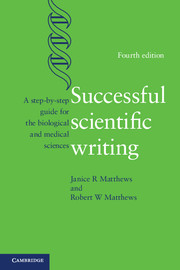Book contents
- Frontmatter
- Contents
- Preface to the fourth edition
- 1 Start with a plan
- 2 Conduct a comprehensive literature search
- 3 Prepare for the challenge
- 4 Begin well
- 5 Compose the IMRAD core of a strong first draft
- 6 Assemble the rest of the first draft
- 7 Compile tables to develop, clarify, and support your story
- 8 Include figures for evidence, efficiency, or emphasis
- 9 Report numbers clearly and responsibly
- 10 Revise for coherence
- 11 Improve style and syntax
- 12 Improve word choice
- 13 Attend to punctuation, capitalization, and other mechanics
- 14 Address your ethical and legal responsibilities
- 15 Oral presentations: adapt the text and visuals
- 16 Share your story in public: presenting talks and posters
- 17 Publication: the rest of the story
- Thirty exercises to improve anyone’s scientific writing skills
- Selected resources
- Index
Preface to the fourth edition
Published online by Cambridge University Press: 05 November 2014
- Frontmatter
- Contents
- Preface to the fourth edition
- 1 Start with a plan
- 2 Conduct a comprehensive literature search
- 3 Prepare for the challenge
- 4 Begin well
- 5 Compose the IMRAD core of a strong first draft
- 6 Assemble the rest of the first draft
- 7 Compile tables to develop, clarify, and support your story
- 8 Include figures for evidence, efficiency, or emphasis
- 9 Report numbers clearly and responsibly
- 10 Revise for coherence
- 11 Improve style and syntax
- 12 Improve word choice
- 13 Attend to punctuation, capitalization, and other mechanics
- 14 Address your ethical and legal responsibilities
- 15 Oral presentations: adapt the text and visuals
- 16 Share your story in public: presenting talks and posters
- 17 Publication: the rest of the story
- Thirty exercises to improve anyone’s scientific writing skills
- Selected resources
- Index
Summary
Why do scientists write? Ask a dozen, and you’ll hear a lot of grumpy answers. “Because I have to!” “Haven’t you heard about publish or perish?” “If I don’t, I’ll never get my degree/get promoted/get a grant/reach full professor!” Seldom do you hear, “Because, actually, I sort of enjoy it!” Such an admission seems to run up against a cultural taboo among academics. Researchers accept, even delight in, an associate’s exhilaration about his or her discoveries, and pat each other on the back when a paper is accepted for publication or a grant proposal is funded. Seldom do they share similar enthusiasm over the actual writing process that was central to those successes. Yet in their free time, and sensing no contradiction, these same individuals may use similar skills to do crossword or sudoku puzzles for relaxation or use their electronic gadgets to puzzle over word games with friends.
There is joy to be found in any creative act, and generally the more skillful one becomes at it, the greater that joy. Why should scientific writing be any different? Could it be that science’s demand that one must write has dampened or killed that joy, in the same way that being forced to do Japanese math puzzles might remove the incentive to do so for pleasure?
Scientific writing makes demands on its practitioner, like any other task done really well. Every facet demands precision and complete accuracy. Rewriting and editing generally require more time than the initial drafting of the content. Yet, does a skilled woodworker complain that sanding takes time? Or a dedicated weaver resent the accuracy required to properly dress a loom?
Scientific writing, too, is a craft, with rules, conventions, and even passing fads. The more completely one understands the basics, the easier mastery becomes. However, this is not enough. We are in a time when the basics of scientific writing and publication are changing extremely quickly, not just in mechanics and rules, but in very outlook. Practices that were once taboo, such as blatant self-promotion and dual publication, have become increasingly acceptable and commonplace. Online journals are springing up like mushrooms, and like fungi, they require careful appraisal to discern the valuable from the potentially toxic. English-language publications are no longer solely paper copy consigned to languish on dusty library shelves, but electronic missives that reach large and diverse audiences around the world.
- Type
- Chapter
- Information
- Successful Scientific WritingA Step-by-Step Guide for the Biological and Medical Sciences, pp. ix - xPublisher: Cambridge University PressPrint publication year: 2014



